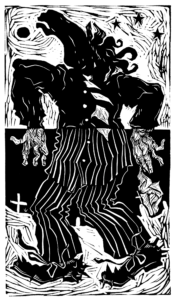The white snow was pelting the window and a cold chill ran throughout the house. I push myself deeper underneath the warm sheets as the movie Camp plays. The song “Right on Be Free” by the Voices of East Harlem played as snow closes off the windows. The line, “I’m gonna live until I’m dead” played in the background as I looked over a portrait. It was a portrait of someone my friend cared about. I frown; the person had died two years ago.
[Please, if you can, listen to the whole song. It is relevant to everything else I write about below.]
I have been talking largely about the issues at SUNY Geneseo and the residual feeling of loneliness that come with it. However, I have not talked about the impact of these incidents. As such, I want to use my own personal experiences this weekend and Steve Prince’s piece “Limbo” to expand on the impact of these incidents. Using these two variables, I want to explain that this feeling of loneliness, is in part derived from the sense of limbo that I feel.
I use the phrase “limbo” because it best describes my state of mind. As the definition of limbo goes, it is an “an intermediate, transitional, or midway state or place”. It can also mean, “a place or state of imprisonment or confinement”. Terms like “spectrum” or “binary” do not quite capture the feeling of confusion and transition that comes with the term “limbo”.
Steve Prince’s “Limbo” incorporates a similar feeling of confusion and transition that I experience. The art piece depicts one of the iconic four horsemen of the apocalypse which find themselves in many of Steve Princes’ pieces. The piece itself has the horse posing; they are paralleled between the blacks and whites of both the world and their clothes. The horse exists within a two-dimensional world of both night and sky where they remain in limbo. It is, as Beth McCoy refers to the, “and/or”. Steve Prince’s horse can embody both night and day within their clothing. At the same time, the horse can embody either night or day through the sky, the ground, or the suit. The horse, is thus in a limbo, transitioning from one time to another. The horse, like with me, feel a deep sense of limbo, whether it is staring out into the sky or being grounded. I can be “midway” and something more or simply “midway”.
Of course, what does this mean, beyond simply an analysis of Steve Prince’s ability to explain limbo? It reflects that being in limbo is not inherently a negative way of thinking. In fact, it is quite enjoyable to be in a state of limbo. For me, I am constantly at that crossroads. For example, I struggle very much on deciding what I want from Chowhound. While to many that would be an arbitrary way to describe this feeling of limbo, it is still an effective and delicious one. I can choose to get chicken bites, or french fries, or a panini but I can get all of that and more. This limbo is not inherently bad [unless you count them saying your name wrong every time]. It is just another day in my life as a college student.
What makes this sense of limbo churn out feelings of loneliness and become negative is when they create a “state of imprisonment or confinement”. For example, when my friend lost their loved one, it was heart-wrenching and very difficult to deal with. That pain had metaphorically imprisoned my friend in grief. Who would not be broken at losing someone that was like a child to you? In the case of my friend Dave, he is in a long distance relationship. Being in a long distance is not inherently a negative situation however it put him in a difficult situation that causes him to hurt.
One could also argue that double consciousness is simply limbo with a racialized lens but I disagree. Double consciousness is only that way because, “One [black people] ever feels his two-ness – an American, a Negro; two souls, two thoughts, two. unreconciled strivings” (W.E.B. Du Bois, The Souls of Black, 9). Black people can and do feel segregated and confined to being either American or African but at the same time not feel at home in either identity. That is extraordinarily lonely and thus the term double consciousness holds its own value separate from being limbo. Thus, as a black queer person, I can be both in limbo and experience double-consciousness. Therefore, limbo is the state of being transitional or half-way-through a situation or circumstance while the feelings that may come from it, is the response. And some responses, help to create terms like double consciousness.
As the movie continued, I and my friend casually chatted about all sorts of things. As we did, I saw a painting and more memories of the person who passed. At the same time, I saw magnets of musical shows, framed art, cd cases filled with musical theater, and family pictures. I smiled, as I pressed my head against a pillow and went back to the movie. In this space, while the problems at Geneseo did not disappear, they came into a new perspective. It begged the question: How do we, confront the problems of the world and what are our ways of coping with it?
